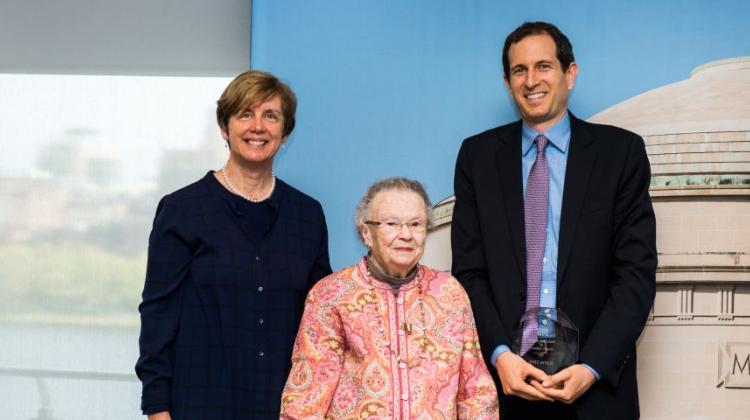Professor Justin Steil Receives Inaugural Paul E. Gray Award

Department of Urban Studies and Planning (DUSP) Professor Justin Steil has been awarded the 2018 Paul E. Gray Award for Public Service from MIT. The selection committee unanimously, and with great enthusiasm selected Steil as the first recipient of the Award, recognizing a member of the MIT faculty who exemplifies building “a better world” through teaching, research, advising, and service. Alison Hynd, Director of Programs at the PKG Center noted, “Justin’s commitment to community engagement runs deep. Many of the students who come through the PKG Center programs speak of Justin as an advisor and mentor, and make a point of how valuable his time and insights have been in helping them to refine their own approaches to community engagement.”
Steil, Assistant Professor of Law and Urban Planning, researches the intersection of urban policy with property, land use, and civil rights law. At MIT, amongst usual teaching and advising responsibilities, Steil teaches an urban sociology seminar at the largest state prison in Massachusetts based on the belief that bringing together students of sociology and urban studies who are incarcerated with those who are at MIT will create a unique and valuable environment in which to generate new knowledge about our social world and the repeated mechanisms that contribute to persistent socio-economic inequality and other pressing social problems. Steil also worked with DUSP students Reed Jordan, Maia Woluchem, and Nicholas Kelly to create the Furthering Fair Housing Project, a research program that analyzes local efforts to eliminate place-based disparities in access to opportunity and makes data and research available to support ongoing municipal efforts to advance fair housing. With DUSP students Nicholas Kelly, Peter Damrosch, and Daniel Traficonte, he has drawn from his research to submit Amicus Curiae briefs to the United States Supreme Court and other federal courts in recent fair housing cases. Through both his research and teaching, Steil also works with local community based organizations in the Boston region doing environmental justice work, affordable housing advocacy, civil rights activism, and community development.
Paul Gray’s (SM ’55, ScD ’60) career at MIT included turns as a student, professor, president, and MIT Corporation chair. Gray’s commitment to MIT, particularly to his students, was showcased in his return to advising and teaching, even after his retirement as Corporation chair. His work at the Institute was carried out in partnership with his wife, Priscilla King Gray, a champion of public service who led efforts to create a sense of community at MIT and cofounded the Priscilla King Gray Public Service Center. 2018 is the first year that the Paul E. Gray award has been given.
In nomination letters, which came from across the Institute, Steil was consistently noted as “a true activist-scholar” who “emphasizes the importance of framing scholarly contributions in dialogue with multiple audiences” and “inspires his students to bridge the gap between purely academic work and applied research that can both inform theoretical discussion” while also nurturing a culture of collaboration. Juan Camilo Osorio, a doctoral student at DUSP, voiced what many of the letters of support evoked, “my experience at MIT would have never been as rich as it has been if it had not been for Professor Steil’s contribution. His guidance and support has gone beyond the duties of a course professor or an examination committee member – he cares for his students in a very generous way.”
On Thursday, May 10th, Steil was publicly recognized at the 2018 MIT Awards Convocation.


